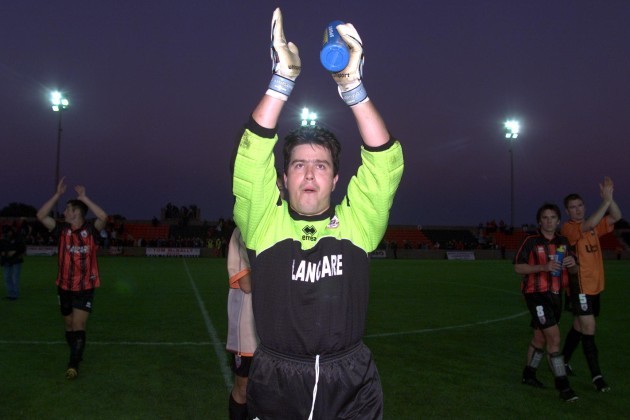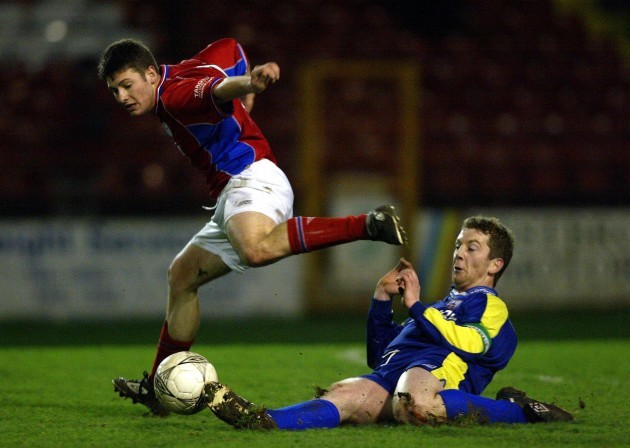LAST UPDATE | 10 Jul 2020
Today, The42 proudly launches Rise of Kenny, a new Irish football podcast series exclusive to our members which charts Stephen Kenny’s journey to become Republic of Ireland manager.
Episode one of the podcast takes us back to the summer of 1998 when a 26-year-old Kenny took charge at struggling Longford Town. Here, Garry Doyle revisits Kenny’s first steps in Irish football.
THE MAN HOLDING the mic is singing Mustang Sally and the crowd in the bar are masquerading as backing vocalists, encouraging the stand-in singer to lose some of his inhibitions. To them, he is a hero, better known for pacing up and down technical areas in League of Ireland grounds than for advising patrons in the Tally Ho that it’s high time Sally slowed her Mustang down.
It is March 2001. Longford Town are en route to their first ever FAI Cup final and the man responsible for the upswing in their fortunes is stealing the show from the band booked for this club fundraiser.
This very same bar on Longford’s main street was where Stephen Kenny got his first senior managerial job. He was 26 and sitting in the lounge when the then Longford Town chairman, Michael Cox, arrived for a chat-cum-interview. “I really want this position Michael but if I get the job, I’d like this to be our last time we do any kind of business in a bar,” Kenny told Cox in summer 1998.
Cox stuck to his word. Together, he and Kenny won promotion in their second season, reached the FAI Cup final in their third, played in the Uefa Cup in the fourth. “We knew he was going places,” said Jim Hanley, Cox’s successor.
You sensed the MC at this fundraiser had a fair idea, too.
“Give a big hand for our manager,” the MC said after Kenny had finished off his party-piece. Pausing for effect, the voice quivered a little when the MC delivered the follow-up sentence. “I hope you never leave us, Stephen,” he said. “You’ve done so, so much for Longford Town.”
But within a year he did leave. “I’m a bit of a restless soul,” Kenny would later admit in a 2017 interview. In January, 2002 the soul singer was looking for a bigger stage.
***
The 1997-98 season had been a particularly poor one for Longford Town, their image tarnished by their failure to turn out in matching shorts and socks for the final match of that campaign. Yet the current manager of Ireland did not seem to mind when he posted his application to become their new manager the following summer.
“I could see a lot of potential in the club,” Stephen Kenny would later say, overlooking the enforced cuts which left him with a IR£1,000 (€1,270) weekly budget.
“That money was for him, the players, his staff,” Cox, Longford Town’s chairman at the time, said. “Put it this way, he wasn’t going to get rich.”
Money wasn’t a motivator. Building a team was. The construction work was swift. There was the goalkeeper everyone said was too small, the midfielder who was considered too slow, the remaining talent drawn from non-league and reserve teams. For Kenny’s first home game, 50 people paid in. By the time he left, Longford were averaging 2,000 at the gate.
“They were great times,” Stephen O’Brien, Kenny’s goalkeeper, would later recall. “And you have to look at them in the context of where I and the rest of the team were coming from.
“Basically I was a failed player. My career began at Gillingham but I never played for their first team. So when I signed for Longford in 1998, I had a lot to prove.
“But I wasn’t alone. We were all in the same boat. I was on £120 a week and was the top earner but there was a bond between us all. We stuck together. We knew money was scarce.”
Without a training facility for their Dublin based players, they went, without permission, to the Phoenix Park to conduct their sessions. And night after night, the park ranger chased them. “We made a joke out of it all, and that anecdote sort of summed that team up,” O’Brien said. “We were a group of players wanted by no one else. But something clicked.”
It certainly did. The club who finished bottom of the pile in 1998 ended up fourth in the First Division in 1999 and then second a year later. Kenny was a specialist, it seemed, in rehabilitating lost footballers and lost souls. Promotion led to even better players joining. There was Sean Prunty, a winger who went on to win two FAI Cups with the club and Stuart Byrne, who’d practically given up the sport when Kenny called.
Together they all went on a journey, Kenny telling them at one of his first training sessions that the aim was to play in Europe within five years. They did it in three.
And yet it nearly didn’t happen at all – the promotion to the Premier, the run to the Cup final, the games in the Uefa Cup.
One night in his second season, Longford were playing a promotion battle against Kilkenny City, and Cox told Kenny there wasn’t money for the players’ wages. That could have been the end, Kenny deciding there and then he would resign at the final whistle, knowing he would lose respect in the dressing room if he was unable to honour his commitment. “I was so down about it,” he would later say. “All we’d built over a year and a half and it was about to go.”
But they’re resourceful people down in Longford. A long-standing fan and committee man, “Butch” Treacy, heard about the predicament and quietly said to Cox he’d sort it. “Give me an hour,” Butch said.
He only needed half that time, racing home to his house to get a bag of coins he’d stored in his sock drawer and had half-forgotten about. Longford were 1-0 down and missing a week’s wages when Butch left the ground. His arrival back at the ground with the wages coincided with them going 2-1 up.
Timing was everything with that Longford/Stephen Kenny story. The Celtic Tiger was roaring but an article by a Longford-born journalist in the Irish Daily Star, headlined “Ghost Town” highlighted how government investment had bypassed the county. Many felt detached from Dublin, the football team’s success restoring pride.
“All these businesspeople kept approaching me, saying, ‘It’s unbelievable what this man is doing for our town, he’s like a lord mayor,’ ” current chairman, Jim Hanley, later told me. “That’s how it was for the few years he was here.”
For his ambassadorial — not to mention his football — work, Kenny earned IR£300 a week when he started, and around IR£30,000 a year when he finished up.
“We gave him a company car… a second-hand one, mind you,” Hanley said, laughing at how he struck a deal with a business client of his, paying IR£50 for the Ford Focus that would transport Mick McCarthy’s successor around Ireland.
The Ford wasn’t the only bargain Longford got. At the end of his first season, Kenny sat down with Pat Devlin, manager of rival side, Bray Wanderers, and struck a deal to sign two of his players, Richie Parsons and Robbie Coyle. “We met in the Shlebourne Hotel,” Devlin says. “I remember walking out of there thinking, this guy is going places.”
He was. But even though Parsons helped him get there, scoring 13 league goals in their promotion season, Kenny didn’t think twice about moving him on before their inaugural Premier campaign. “He’s ruthless in his selections, yet sympathetic to the person,” Vinny Perth, who served as Kenny’s assistant for six years at Dundalk, later said.
Perth knew all about it. “As a League of Ireland player, European nights are the games that you always remember,” he said in a 2018 interview with me.
Memories of that European night to play Litex Lovech in Bulgaria will never be forgotten by those Longford Town players or supporters who made it. Several fans, it transpired, never made it beyond the departure lounge of Dublin Airport as the original charter failed to arrive. Instantly, Hanley realised the severity of the situation and immediately got his credit card out to book the entire team on an alternative journey the next day.
Somehow they made it in time, although Perth’s father did not arrive until an hour after the final whistle, having trekked his way through six different countries en route to Bulgaria.
“And he (Kenny) still left me out, despite all that hardship that dad went through,” Perth said. “That’s the game we’re in. It’s never personal. He had a call to make and he made it and to be fair to Stephen, he came up to me on the trip home, in Heathrow airport, to thank me for my professionalism and to empathise with my plight. That’s the way he manages.”
Once, in a conversation with Roy Coyle, the most successful manager in Irish League history, Kenny was advised to ‘Never let sentiment get in the way.’ “And he’s right,” Kenny told me in 2017. “You can’t. You just can’t, not when you’re picking a team, not when you’re releasing a player.”
So hard, unsentimental choices were made. Parsons was a favourite with the fans but got released; Perth was his most committed player but Alan Reynolds – ironically now Perth’s assistant – got selected instead for that Uefa Cup game. The MC at the fundraiser begged Kenny to stay. But he left midway through the 2001-02 season for Bohemians.
What he also left was a legacy. An all-seater stadium replaced the homely ground that was there before his arrival; the club’s new found confidence was reflected in the years after he left when Longford won three major trophies under Alan Mathews’ astute management.
More than anything, though, the memories of those winters of ’99, ’00 and ’01 had a bit of touch of old-fashioned sporting romance about it, a Midlands Miracle with a rhythm and blues soundtrack.
The42 is on Instagram! Tap the button below on your phone to follow us!



